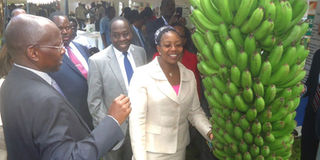Do not panic; there is enough food for all, government says

Agriculture PS Sicily Kariuki (right), with Kari director Ephraim Mukisira, admires a 90-kilogramme banana at a demonstration plot in Kari-Embu on April 15, 2014. The country’s food balance sheet is healthy, contrary to reports of food shortages, agriculture Principal Secretary Sicily Kariuki has said. FILE PHOTO / CHARLES WANYORO / NATION MEDIA GROUP
What you need to know:
- There are about 8.8 million bags of maize in the country in the Strategic Grain Reserve (SGR) or held by farmers, traders, millers and food agencies, official says.
- Speculators said to be taking advantage of the market to hoard maize and sell later it at exorbitant prices.
The country’s food balance sheet is healthy, contrary to reports of food shortages, agriculture Principal Secretary Sicily Kariuki has said.
Ms Kariuki said the latest field assessments for June to August indicate there are approximately 8.8 million bags of maize in the country in the Strategic Grain Reserve (SGR) or held by farmers, traders, millers and food agencies.
In addition, the informal flow of maize into the country from East African Community states is estimated at 1.5 million bags, giving a combined 10.3 million bags against a monthly consumption requirement of 3.8 million bags.
“The latest assessment of the food situation in the country shows that we are fine. We should not panic. We have sufficient food in the country,” the PS told the Sunday Nation.
MAIZE STOCK
Concerns about a looming food shortage were heightened a few weeks ago when Agriculture Cabinet Secretary Felix Koskei announced the government was planning to import about three million bags of maize from neighbouring countries to boost stock.
“The ministry will initiate government-to-government discussions within EAC and Comesa countries where non-GMO maize is available for the private sector to import up to two million bags cheaply before August, when the harvest from the South Rift region is expected,” Mr Koskei said then.
In addition, the Agriculture secretary had also said the Treasury would allow registered millers to import duty-free one million bags of non-GMO maize by end of July.
But Mrs Kariuki said the Agriculture Secretary’s remarks had been misinterpreted and had led to speculators taking advantage of the market to hoard maize and sell it later at exorbitant prices.
ERRATIC RAINS
The PS said Mr Koskei’s remarks concerned next season, which does not look promising because of irregular rain patterns and could see a depressed harvest from August.
“Because of erratic rains, there might be a reduction in the harvest by 10 to 15 per cent. The current food situation is fine. We are only looking at the future,” she said.
“Normally, in an optimal year, we project that we get over 40 million bags. In the grain basket areas (North Rift), however, the recovery has been very good. But you look at areas like Narok and surrounding regions, the recovery has not been very good.” she said.
The PS said the government was working on changing “this perpetual panic mode” by intensifying the fertiliser subsidy programme and supporting farmers to obtain subsidised or free certified seeds and doing soil analyses to boost productivity.
“Another short-term to medium-term intervention is the one to do with small-scale irrigation schemes in the country. We are rehabilitating them and supporting the farmers,” she said.
LONG-TERM SOLUTION
The PS also appealed to Kenyans to be patient as the government worked toward a long-term solution through large-scale mechanised irrigation, such as the Sh250 billion Galana-Kulalu scheme in the Coast region.
The scheme was launched in January by President Uhuru Kenyatta to put millions of acres under mechanised irrigation to ensure food security in the country.
She said the multi-billion-shilling project has taken off, with the feasibility studies already completed. The project was to be implemented in three phases, starting with a 10,000-acre model farm.
The second phase comprises laying the infrastructure that will run simultaneously with the third phase of allowing the investors to come in.
“We have designated and cleared the area the 10,000-acre model farm is going to be. The message we have for Kenyans is that we should always look at an infrastructure project with a bit of patience,” she said.
Kariuki said that contrary to some beliefs, what the president commissioned in January was a consultancy, which has been finalised by Israeli experts who undertook the work.





